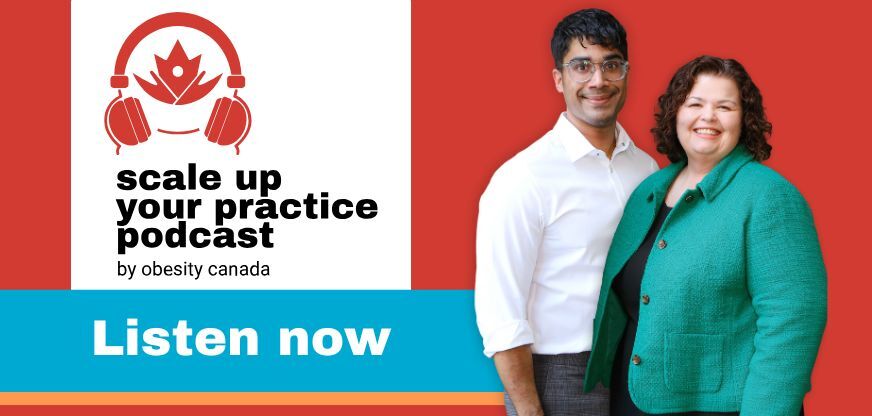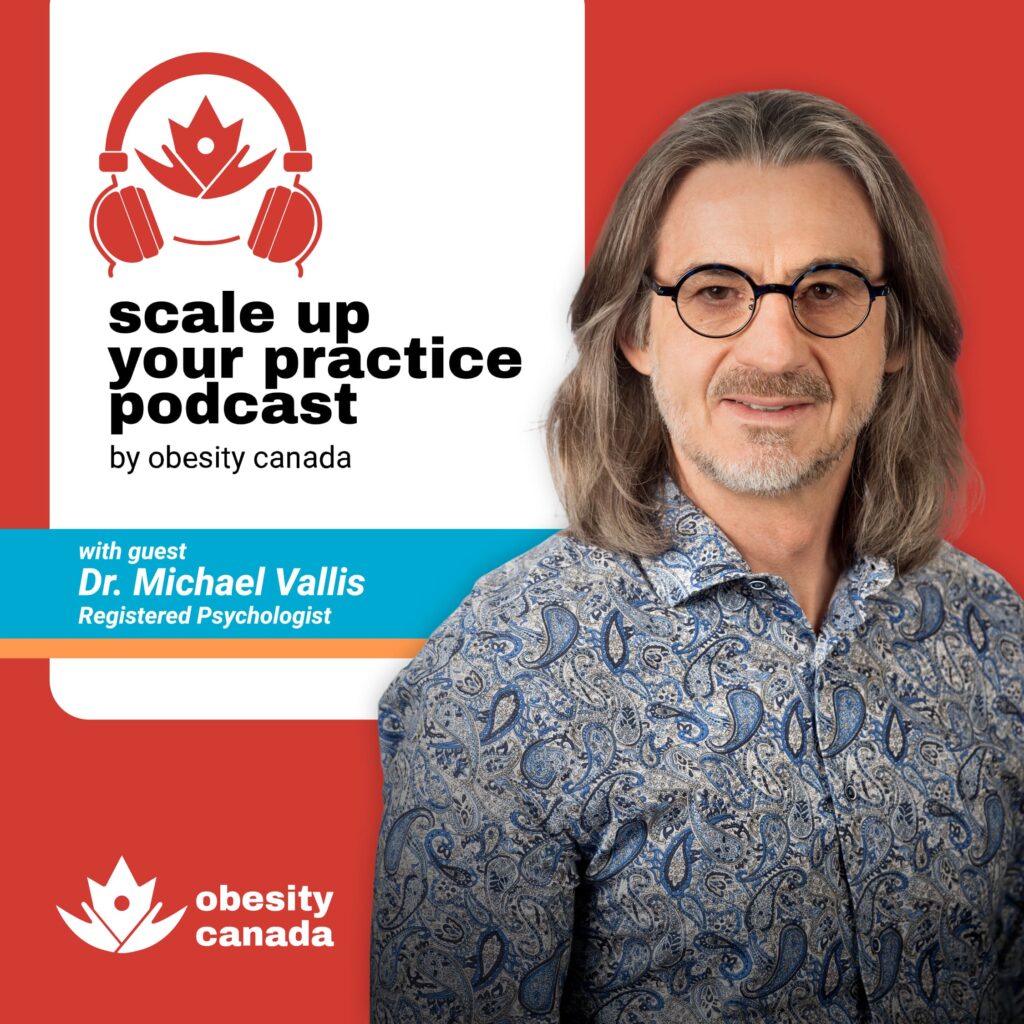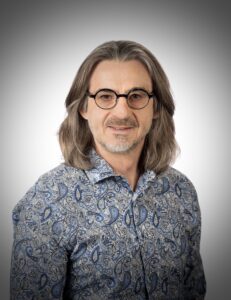– Welcome to “Scale Up Your Practice,” the podcast brought to you by Obesity Canada. I’m Dr. Roshan Abraham, a family physician and Associate Professor in the Department of Family Medicine at the University of Alberta. Every day in my practice, I see firsthand the complex realities of obesity, both for individuals and across our healthcare system.
– And I’m Michelle McMillan. I’m a lived experience expert with Obesity Canada. In each episode, we bring together diverse voices, clinicians, researchers, and people living with obesity like myself to explore the evolving world of obesity management. Our goal, to help you navigate the disease of obesity with clarity and confidence.
– Today’s episode has been sponsored by Eli Lilly Canada. Obesity Canada received an unrestricted educational grant for this episode. Today’s episode is the second of six in a series “Celebrating Canadian Excellence,” where we will meet with Canadian experts and learn a little bit more about them and how they got into the field of obesity. Today we’re thrilled to welcome global obesity expert, Dr. Michael Vallis.
– Thank you very much for Roshan and Michelle. It’s really great to be here.
– We’re so thrilled to have you. I think if we could start at the beginning as we tend to say, how about if you introduce yourself a little bit and tell us, you know, how you stepped into the world of obesity medicine and kind of what prompted you. And as we jokingly say around here at the podcast, it’s probably not the type of medicine to make $1 million or to become rich and famous so it’s curious, I’ve been curious to know what drew you to this line of medicine?
– That’s, yeah, that’s a really interesting question. So, for me, it was the opportunity to really understand what I like to call disease-based distress. So, as a psychologist, I’ve always been interested in the emotional, the relational, the behavioral aspect of health. And working in chronic disease management in a medical system has put me as part of a comprehensive team. And so working side by side with physicians, nurses, dieticians, pharmacists, et cetera, that sort of medical and psychological interface was really, really intriguing to me. And obesity is the really the perfect example of how we can understand normal experience. And that was important to me because then it sort of took the potential for interventions to go away from the one-on-one closed door, you know, every second week for two years, psychotherapy kind of interventions that was really probably the dominant way that psychologists practiced when I started practice. But I started to realize through my experience working with people living in larger bodies, that in fact it was understanding normal human behavior. And then what that led to was the opportunity to really collaborate, which isn’t just receiving referrals from your colleagues and then providing independent care, but really promoting psychological wellbeing, behavioral self-management across the board. So, really that interdisciplinary approach along with what I like to call kind of normal psychology, I sometimes think about myself as someone whose expertise is common sense.
– Thank you so much for getting into that because I do think that’s something that it will be great to explore. Before we get into that, let’s get to know you a little bit more. What’s your background for our listeners? Where are you working currently? What’s your professional background? Any affiliations that are, I guess our listeners should be aware of?
– Sure, yeah. I’ve been around a long time. I’ve had the pleasure of having maybe two good ideas in my whole life, which I believe is from an academic perspective, actually good. And those two ideas were, was sort of early on when I was first graduated and started to, I was working inside cognitive behavior therapy and I started to realize, because I started the Cognitive Therapy Unit, it’s what is now CAMH, but then it was called The Clarke Institute of Psychiatry. And Brian Shaw, another psychologist in, I was junior to him, he was my boss. We started the Cognitive Therapy Unit, and it was good, was good for research. But clinically we ended up within about three or four years in Toronto having a bad reputation in the community. And the bad reputation was because we were so selective about the patients that we would see. We would refuse maybe 40, 50% of the referrals on the telephone. We would then do a screening. And I started to realize at this point that we were actually selecting people to fit the therapy. And this was something that I started to recognize, this is not okay, it’s not okay just to cherry pick the right patients. And so this sort of set me on a path to really try to kind of figure out, how do you adapt therapies to people? And that’s when you get less connected to, I’m a cognitive therapist, I’m a psychodynamic therapy, you get less directed towards connected to the therapy than to the patient, to the person, and what their experience is and how that experience actually really would normalize what they’re going through. And I think that’s the key there. I started to realize that, you know, this profession that I’m in is not about, you know, abnormal people in normal worlds, it’s really about normal people in abnormal worlds. And when we start to understand the experience of obesity, we see how society, and then clinicians, and then citizens have got it wrong for a very long time in terms of understanding the science. And so this has become an ever intriguing professional focus for me in terms of just normalizing. And then when you normalize things, then you don’t have to be a psychologist to do all of that work. And therefore, I was really fortunate to discover how productive collaborative care can be. And that kinda led me into my second idea, which was developing a training program to try to empower other health professionals to incorporate many of these principles. And that’s kind of what I’ve been spending most of my time over the last 15 years on. So, I actually left the clinical service area about five years ago to really focus in on my teaching and my research and preparing myself to kind of semi-retire.
– So, you spoke a little bit about collaboration and of course, you know, the focus of our audience here, although not exclusive, is healthcare practitioners. So, maybe just to, if you could explore a little bit about what you’ve developed with that collaboration, both professionally with your colleagues and with your patients. I’m just curious about it.
– The fundamental shift really is, I think critically, critically important, which is, and I try to remind myself of this, medicine’s roots are in biochemistry. And so if you start to think a bit about that, what were the actual genesis of the practice of clinical medicine? And it all kind of started when we discovered chemicals that would have an impact on health outcomes and then everything kind of came from there. So, we have a very transactional history behind us. If this, then this, if it is X, it’s not Y. And so it was reductionistic and deterministic approaches that medicine can sometimes develop. And I think for me it’s that shift that in fact, clinical care of chronic conditions is much more relational than it is transactional. And so, for instance, the real essential message that I think we could all adopt is that it’s not your job to diagnose, treat, and measure outcomes. Not unless you’re in the OR, not unless you’re doing a procedure, not unless you’re doing some kind of a protocol where you are in charge of the outcome. If you’re in charge of the outcome, you can separate the Siamese twins from a surgical procedure, then it’s all up to you, and your competency is so critically important. Anything that requires behavior, anything that requires action on a person’s part outside of the clinical context, this becomes much more relational. And so the question that I love to pose is, why should I listen to anything you say? And if the patient doesn’t have an answer to that question, then that could be problematic. Such as many of our patients say, well, I guess I should listen to you, doctor, because you’re a doctor, you’re an expert, so I guess I should listen to you. When you hear that, you know that people cannot sustain any of those behaviors associated with that because they’re doing it because you’re the expert. Not because they want to, not because it’s important to them, not that they have values-based goals that would allow them to overcome barriers, but because you’re the expert, your influence doesn’t carry that far. Perhaps your patient will say, well, I guess I should listen to you because I know I should do those things ’cause I know they’re good for you. Well, people aren’t like that. We do not operate based on our shoulds, human condition is to operate based on our wants. And so what we’re really discovering here is that sometimes patients would answer that question, why should I listen to my doctor with an answer like, because it’s important to me. I wanna be bouncing my grandkids on my lap when I’m 85 years of age. I wanna, you know, trek the Camino trail after I retire, right? Personal meaningful reasons. And so as a result of that, I think obesity medicine has to be transaction, not transactional has to be relational, it’s that relationship that we establish. And so then I simply tried to provide a model that is representative of the behavioral sciences that can then be translated into clinical care. What do I say next to the patient? And so I think the essence of this work is really the understanding that obesity as a chronic medical condition requires relational approach. As the victim of stigmatization that makes people living in larger bodies vulnerable, we are obligated, in my opinion, to not only establish a relational stance, but establish a respectful relationship stance, which means asking and listening before speaking.
– That is so refreshing to hear. And I think it’s really important for me as a clinician, as a clinician educator, and hopefully for our listeners to hear it being said in that way, medicine did and continues to be thought of as a transactional science, and the shift towards a more relational approach is challenging, even in my role as an educator trying to shift that in the undergraduate or even postgraduate worlds because of how firmly rooted we are in that transactional approach in medicine, it’s challenging, it’s the bedrock of medicine whether people like to admit to it or not. And I think it is so refreshing to hear that and to hear of how that, how you were able to build something out of that realization. What are you doing then on a regular basis at your current institution, in your current work that sees that through? I think our listeners would love to hear what that application looks like.
– I have a very privileged professional life. I have to confess. I have, I describe myself as, you know, someone who doesn’t know a lot, but I know a lot about little and the sense that the area in which I work is an area that I have been in for a very long time. I learned as a graduate student something I actually kind of believe from a scientific perspective. And the phrase that we used was never stray far from your data. And so I always try to make sure that if I ever present anything, I actually know what I’m talking about. I know that sounds kind of funny, but it’s actually easy to get sort of pulled out of your lane a little bit. And so for me it’s this area, and as I’ve said, because of those two ideas I had, cognitive behavioral therapies really became practical strategies, action-oriented strategies that were defined and measured, they could be trained, they could be supervised upon. And as soon as you develop that, it doesn’t belong to anybody, it doesn’t belong to any one profession, it just belongs to the people who have been sort of trained in that. And then with the Behavior Change Institute that I created, and now literally I spend my time responding to people asking for me to help them out. And so I literally, I don’t have like, quote, unquote, “a day job” anymore. I work as a consultant. I have an academic appointment, but I don’t really, it’s not a paid appointment, so I don’t have a lot of university obligations. It’s a status-only appointment, which allows me really then to provide consultation services. And so this has been incredibly rich because I work with a number of government organizations, hospital systems, individuals who are looking for conference presentations. I consult a pharmaceutical industries. I’ve been involved in many of the pharmaceutical trials. Interestingly, everybody is so kind of excited about the pharmaceutical trials because of the pharmaceutical product. But maybe something the audience may not know is that these trials were also implemented where there was really good behavioral standard of care counseling. And I was involved in these studies to provide support to the staff who were running the trials such that we were able to say these pharmacotherapies that are being evaluated are being evaluated on the basis of good lifestyle support. So, those are the sorts of scenarios that I think I have found myself in. So, for me, I travel quite a bit to do so, because I will travel, I just returned from a trip to Brazil. And so it’s kind of a sort of a very comfortable sort of position here for me. I have time to read, which I haven’t had many clinicians really struggle to have enough time to read. I actually do have time to read now, which is super cool. So, I feel like I have really kind of in a way won a lottery to actually be in a situation where you’ve got something to say that maybe other people could find helpful.
– Michael, given your vast experience and the fact that you work with so many different groups and individuals, if you had to pick one thing, and I know this may be an impossible question that you’d want our listeners to know about obesity management, what would be the one thing that you’d wanna pass along to them today?
– The strongest predictor of success is not giving up. And if we look at the relational connection between the person living with obesity and the healthcare professional trying to support the individual, if you could just take this perspective that you are really part of a team and that working together is really the solution. So, the next time you get stuck and you start to think, okay, I don’t know what to say now, safest thing is to say nothing. Simply say to your patient, I’m kind of stuck, I’m not sure what to say, what do you think we should do next? And that you will collectively and in this relationship you’ll share this space. And so I think my observation is that when it comes to the support of people living with obesity, many of us are experts. We sort of almost get trapped by that expertise and think, oh, I’m not sure, so I’ll just be safe and do nothing. You’re not alone, your patient is your partner. That’s what I would say.
– Thank you so much for joining us today, Dr. Vallis. It was a pleasure to hear some of your background and celebrate you as a leader in the obesity space. To our listeners, we hope our discussion has been informative and has opened your mind to be curious about the evolving science in the fast moving field of obesity.
– Help us spread the word by sharing this podcast with a colleague, and don’t forget to subscribe on your favorite podcast platform. And if you want to go the extra step, we’d love to hear from you and have you write us a review.
– Until next time, keep scaling up your practice. This podcast is intended for informational and educational purposes only and does not constitute medical advice. The content shared in this podcast should never be used as a substitute for professional medical advice, diagnosis, or treatment. Always seek the guidance of a qualified healthcare professional with any questions you may have regarding your health or a medical condition. The information and treatments discussed in this podcast are based on Canadian guidelines and approved practices as of the time of recording. If you’re listening from outside of Canada, please consult your local healthcare professional to ensure compliance with your region’s medical standards, guidelines, and recommendations. The creators of this podcast disclaim all liability for any decisions or actions taken based on the content discussed. Listening to this podcast does not establish a professional or patient-client relationship.


